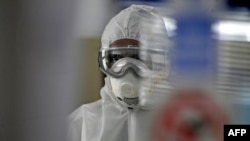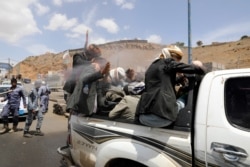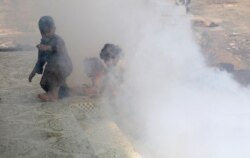The United Nations warned Thursday that the threat of the coronavirus in war-ravaged Yemen requires attention and resources, making a nationwide cease-fire even more urgent.
"Yemen cannot face two fronts at the same time: a war and a pandemic," U.N. Yemen envoy Martin Griffiths told a virtual meeting of the Security Council on Thursday. "The new battle that Yemen faces in confronting the virus will be all-consuming. We can do no less than stop this war and turn all our attention to this new threat."
Griffiths said both the Yemeni government and Houthi rebels understand this, as do the actors who back them.
"There cannot be a more timely moment for the two parties to commit to silencing the guns and ending the conflict through a peaceful, political solution," Griffiths said. He said he expects the parties to formally accept proposals on a cease-fire, as well as humanitarian and economic agreements in the "immediate future."
Yemen recorded its first confirmed case of COVID-19, the disease caused by the coronavirus, on April 10. Half of all medical facilities in the country are not functioning, so it is not clear how much testing for the virus is available.
The country, already the poorest in the Middle East before its civil war started five years ago, is also badly positioned to treat victims of the respiratory virus, while protecting its health care workers.
On April 8, the Saudi-led coalition that backs the Yemeni government, announced a unilateral two-week cease-fire. But despite the announcement, fighting has continued in some areas.
"Marib, the governorate of Marib to the east of Sanaa, remains the center of gravity of this war, yet it is not the only theater," Griffiths said. "The sooner we can stop the fighting, the better."
More than five years of conflict has deepened Yemen's poverty, devastated its infrastructure, and caused widespread hunger and suffering.
"As a result, epidemiologists warn that COVID-19 in Yemen could spread faster, more widely and with deadlier consequences than in many other countries," warned U.N. humanitarian chief Mark Lowcock. "We are, in other words, running out of time."
Funding cuts
He said the U.N.'s humanitarian fund for Yemen has received about $800 million this year – compared with $2.6 billion for the same period last year. As a result, 31 out of 41 major U.N. programs will start closing in the next few weeks if cash doesn't start coming in.
"This means we will have to start eliminating many of the activities that may offer Yemenis' best chance to avoid COVID-19," Lowcock said.
Yemen has also battled cholera, and funding cuts will affect all health programs. Lowcock said the World Health Organization estimates that 80% of health services provided through U.N.-funded programs could stop at the end of this month.
The aid chief said nutrition programs will also be cut, affecting 260,000 severely malnourished children and 2 million others with moderate malnutrition.
"These children's immune systems will be weakened, making them much more vulnerable to COVID-19 and other diseases," he said.
Yemen's economy has been in a state of collapse for years and for many families remittances from relatives abroad are their only safety net, bringing in more than $3 billion annually.
"But COVID-19 is affecting the economies where expatriate Yemenis work," Lowcock said. "A group of Yemeni economists and private-sector leaders recently projected that remittances could drop by as much as 70% in the coming months. This places us in uncharted territory."
The U.N.'s humanitarian operation in Yemen is its largest globally. Each month, the organization assists 13 million people across the country.








